Related Research Articles
The BBC Symphony Orchestra is a British orchestra based in London. Founded in 1930, it was the first permanent salaried orchestra in London, and is the only one of the city's five major symphony orchestras not to be self-governing. The BBC SO is the principal broadcast orchestra of the British Broadcasting Corporation (BBC).
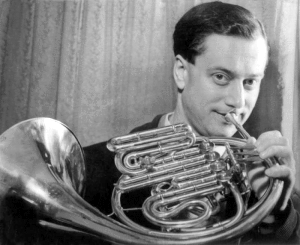
Dennis Brain was a British horn player. From a musical family – his father and grandfather were horn players – he attended the Royal Academy of Music in London. During the Second World War he served in the Royal Air Force, playing in its band and orchestra. After the war, he was the principal horn of the Philharmonia and Royal Philharmonic orchestras, and played in chamber ensembles.

The London Symphony Orchestra (LSO) is a British symphony orchestra based in London. Founded in 1904, the LSO is the oldest of London's symphony orchestras. The LSO was created by a group of players who left Henry Wood's Queen's Hall Orchestra because of a new rule requiring players to give the orchestra their exclusive services. The LSO itself later introduced a similar rule for its members. From the outset the LSO was organised on co-operative lines, with all players sharing the profits at the end of each season. This practice continued for the orchestra's first four decades.

The Philharmonia Orchestra is a British orchestra based in London. It was founded in 1945 by Walter Legge, a classical music record producer for EMI. Among the conductors who worked with the orchestra in its early years were Richard Strauss, Wilhelm Furtwängler and Arturo Toscanini; of the Philharmonia's younger conductors, the most important to its development was Herbert von Karajan who, though never formally chief conductor, was closely associated with the orchestra in the late 1940s and early 1950s. The Philharmonia became widely regarded as the finest of London's five symphony orchestras in its first two decades.
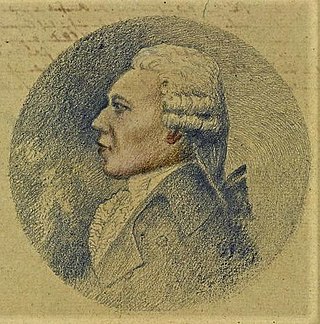
Carl Philipp Stamitz was a German composer of partial Czech ancestry. He was the most prominent representative of the second generation of the Mannheim School.

John Alexander Brymer OBE was an English clarinettist and saxophonist. The Times called him "the leading clarinettist of his generation, perhaps of the century". He was largely self-taught as a player and he performed as an amateur before being invited by Sir Thomas Beecham to join the Royal Philharmonic Orchestra in 1947. He remained with the orchestra until 1963, two years after Beecham's death.

Sir Colin Rex Davis was an English conductor, known for his association with the London Symphony Orchestra, having first conducted it in 1959. His repertoire was broad, but among the composers with whom he was particularly associated were Mozart, Berlioz, Elgar, Sibelius, Stravinsky and Tippett.
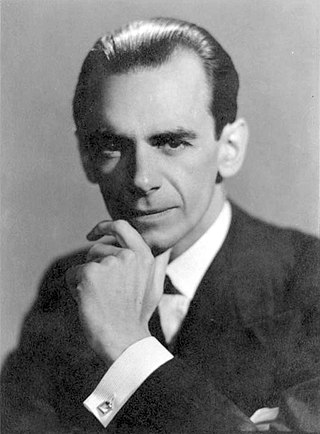
Sir Harold Malcolm Watts Sargent was an English conductor, organist and composer widely regarded as Britain's leading conductor of choral works. The musical ensembles with which he was associated included the Ballets Russes, the Huddersfield Choral Society, the Royal Choral Society, the D'Oyly Carte Opera Company, and the London Philharmonic, Hallé, Liverpool Philharmonic, BBC Symphony and Royal Philharmonic orchestras. Sargent was held in high esteem by choirs and instrumental soloists, but because of his high standards and a statement that he made in a 1936 interview disputing musicians' rights to tenure, his relationship with orchestral players was often uneasy. Despite this, he was co-founder of the London Philharmonic, was the first conductor of the Liverpool Philharmonic as a full-time ensemble, and played an important part in saving the Royal Philharmonic Orchestra from disbandment in the 1960s.

Albert Coates was an English conductor and composer. Born in Saint Petersburg, where his English father was a successful businessman, he studied in Russia, England and Germany, before beginning his career as a conductor in a series of German opera houses. He was a success in England conducting Wagner at the Royal Opera House, Covent Garden in 1914, and in 1919 was appointed chief conductor of the London Symphony Orchestra.

Sir Herbert Hamilton Harty was an Irish composer, conductor, pianist and organist.

Johann Baptist Isidor Richter, or János Richter was an Austro-Hungarian orchestral and operatic conductor.
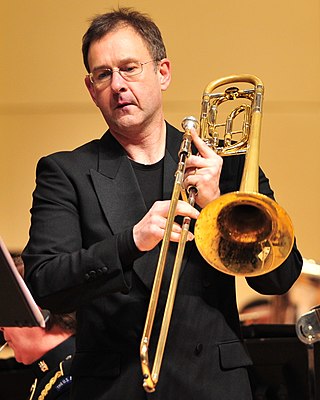
Ian Bousfield is an English musician who has held positions as Principal Trombone with the Vienna Philharmonic Orchestra, the London Symphony Orchestra and the Hallé Orchestra. Also a pedagogue, Bousfield is an instructor in the music division at the Hochschule der Künste in Bern, Switzerland.

Barry Emmanuel Tuckwell, was an Australian French horn player who spent most of his professional life in the UK and the United States. He is generally considered to have been one of the world's leading horn players.
Aubrey Brain was a British horn player and teacher. He was the father of Dennis Brain.
Neill Joseph Sanders was a British horn player, principal horn of the London Philharmonic Orchestra and the BBC Symphony Orchestra, and for 29 years a member of the Melos Ensemble. He was a professor at Western Michigan University in Kalamazoo, Michigan and founded the Fontana Ensemble and the Fontana Concert Society with its summer festival.
Alfred Edwin Brain Jr. was an English French horn player.
Alfred Edwin Brain was an English player of the French horn. He was the founder of a great school of English horn playing. His grandson Dennis Brain was to become perhaps the most famous horn player of all time.

Edric Cundell CBE, was a British music teacher, composer and conductor.
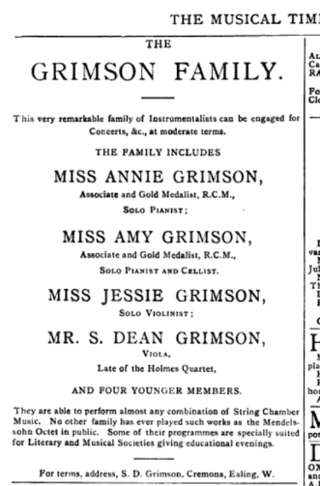
The Grimson family was a family of classical musicians active in London from the early 1870s.
References
- ↑ "Friedrich Adolph Borsdorf (1854-1923)". International Horn Society. Retrieved 30 October 2019.
- ↑ Niall O’Loughlin. 'Borsdorf, Friedrich Adolf', in Grove Music Online (2001)
- ↑ R. Morley-Pegge. The French Horn, 2nd. edition (1973)
- ↑ 'Richter Concerts', Musical News, Vol. 10 (1896), p. 532
- ↑ The LSO in World War I: The Sad Tale of Adolph Borsdorf , London Symphony Orchestra website
- ↑ Barry Tuckwell. Horn (Yehudi Menuhin Music Guides, 1983)
- ↑ Pettitt, Stephen. Dennis Brain: A Biography. London: Robert Hale, 1976. ISBN 0-7091-5772-X
- ↑ Oscar Bradley, IMDb entry
- ↑ Johnson, Jo. "The LSO in World War I: The Sad Tale of Adolph Borsdorf". London Symphony Orchestra. Retrieved 30 October 2019.
- ↑ The Horn Player, Vol. 19 No. 2 (Summer 2022), p. 27